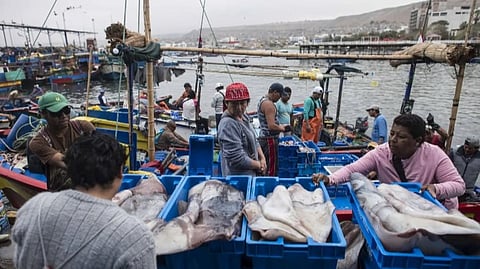

Jumbo flying squid is Peru's main artisanal fishery, key to the well-being of thousands of families.
Photo: Produce.
After suspending it on June 30, on August 25, Peru's Ministry of Production (Produce) reopened the jumbo flying squid fishery under an extended and differentiated two-stage schedule, new management rules, and an update of the annual quota to 504,000 tons. Just 15 days later, when only 10 days of the first stage had elapsed, the quota allocated for that period had already been caught, prompting Produce to issue a new suspension order.
Following a scientific survey by the Peruvian Sea Institute (Imarpe) that certified the good biological condition of the population and an increase in the average weight of the resource, on August 21, Produce reported that a decision had been made to increase the annual exploitation quota for jumbo flying squid for 2025 from 421,000 to 504,000 tons.
Of that total, 82,000 tons remained available for the rest of the year. To guarantee the sustainability of the resource and also regulate fisheries management, the Peruvian Ministry of Production decided to divide that quota into two fishing stages and also to regulate vessel access to the resource based on their size.
Thus, Produce set the first fishing stage between October 25 and 31, 2025, for which it allocated 39,594 tons, equivalent to 48% of the established quota.
As for access by size, artisanal vessels with a hold capacity of up to 20 m³ were able to fish from August 25; those that participated in and satisfactorily completed the work plan for the scientific operation carried out in August, were able to do so from September 1; and, finally, the rest of the artisanal vessels up to 32.6 m³ were able to set sail from September 9.
As mentioned, all of them had October 31 marked as the end date for that first stage. However, technical monitoring of daily landings showed that the established quota had already been reached before September 10, so, as a preventive measure, the suspension of activity was ordered for midnight on that day.
"Reaching the quota before the deadline confirms the fishing power of our artisanal jumbo flying squid fleet; that is why this decision is based on scientific and fishing evidence and reflects the State's commitment to the sustainability of our marine resources. Jumbo flying squid is our main artisanal fishery, and its responsible management is important for the well-being of thousands of families," said Peru's Vice Minister of Fisheries and Aquaculture, Jesús Barrientos, after the suspension was decreed.
"This decision is not a closure, but rather a necessary pause to ensure that the resource continues to be a source of employment, food, and development for the country," he added. "The resumption of fishing, scheduled for November, will take place under clear rules, with greater traceability and control, for the benefit of a more formal and equitable activity."
The restart referred to by Vice Minister Barrientos is the second fishing season, which, in its August decision, Produce set between November 1 and December 31. A total of 42,432 tons, 52% of the established quota, were allocated for this period, to which, once again, vessels will have access according to a progressive schedule.
In this case, from November 1, artisanal fishing vessels with a hold capacity of up to 20 m3 will be able to fish, and from November 16, those with a hold capacity greater than 20 m3 and up to 32.6 m3 will be able to do so.
Peru has been regulating all year to reinforce the protection of jumbo flying squid. Thus, in March, it approved a new Fisheries Management Regulation to manage the exploitation of the species and ensure its sustainability, and in June, it went further with a package of measures responding to the need to guarantee the responsible use of this important resource.
The new measures taken in August were a further step in that direction. When introducing this new method of fisheries management for jumbo flying squid, Peru's Vice Minister of Fisheries and Aquaculture pointed out that the restart was taking place under clear and transparent rules, with control measures to ensure that every ton caught is recorded and monitored.
"This is how we strengthen formality and ensure that squid fishing continues to be a driver of employment, domestic consumption, and exports," he said then, adding that the decision was based on the best available scientific evidence, which seeks to balance the economic exploitation of jumbo flying squid with its long-term sustainability.
As Produce now highlighted, jumbo flying squid is Peru's most important hydrobiological resource for artisanal fishing and direct human consumption, with exports exceeding USD 600 million annually and a decisive impact on fishing employment - it involves 4,475 artisanal vessels, generating direct employment for more than 14,000 fishermen, and benefiting some 70,000 people - and the regional economy.
